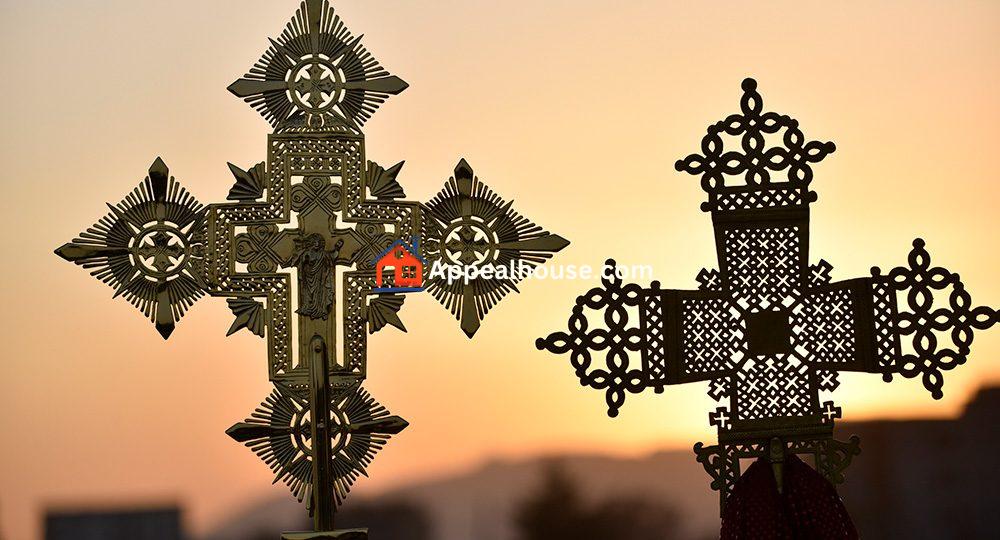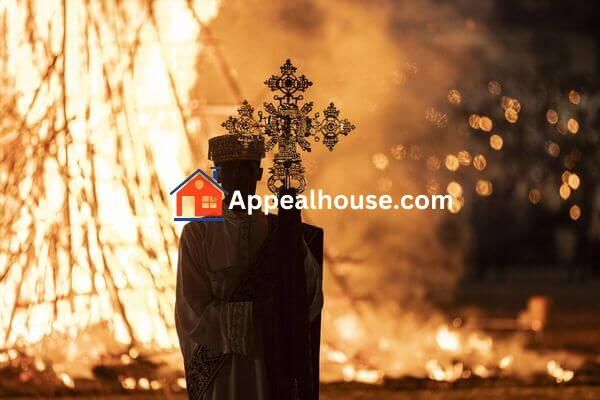
Discover the significance of the Meskel holiday in Ethiopia, a vibrant festival celebrated with the famous Demera bonfire, traditional songs, and community gatherings. Learn when Meskel is celebrated and explore its rich history and customs.
Table of Contents
What is Meskel?

Meskel (መስቀል), meaning cross in Ge’ez, is one of Ethiopia’s most sacred and colorful holidays. It commemorates the Finding of the True Cross, believed to be the cross on which Jesus Christ was crucified. The festival has been celebrated in Ethiopia for over 1,600 years.
Meskel is one of Ethiopia’s most treasured religious holidays, celebrated with vibrant gatherings, bonfires, and age-old traditions. The word Meskel means “cross” in Ge’ez, the ancient liturgical language of Ethiopia. The festival commemorates the discovery of the True Cross by Queen Helena (Saint Helena), the mother of Roman Emperor Constantine, in the 4th century.
Historical Background
According to Christian tradition, in the 4th century AD, Empress Helena (mother of Emperor Constantine) went to Jerusalem to find the True Cross. She was guided in a vision to light a large fire, and the smoke led her to the spot where the cross was buried. The story was passed down through generations, and Meskel became an important religious and cultural event in Ethiopia.
When is Meskel Celebrated?

Meskel is observed every year on September 27 in the Ethiopian calendar (or 28th during leap years). In the Gregorian calendar, this typically corresponds to September 27 or 28, depending on the year.
| Gregorian Year | Meskel Date |
|---|---|
| 2021 | September 27 |
| 2022 | September 27 |
| 2023 | September 27 |
| 2024 | September 27 |
| 2025 | September 27 |
| 2026 | September 27 |
| 2027 | September 27 |
| 2028 | September 27 |
| 2029 | September 27 |
| 2030 | September 27 |
| 2031 | September 27 |
| 2032 | September 27 |
| 2033 | September 27 |
| 2034 | September 27 |
| 2035 | September 27 |
| 2036 | September 27 |
| 2037 | September 27 |
| 2038 | September 27 |
| 2039 | September 27 |
| 2040 | September 27 |
| 2041 | September 27 |
| 2042 | September 27 |
| 2043 | September 27 |
| 2044 | September 27 |
| 2045 | September 27 |
| 2046 | September 27 |
| 2047 | September 27 |
| 2048 | September 27 |
| 2049 | September 27 |
| 2050 | September 27 |
Meskel Holiday Cultural and Religious Significance
Meskel marks the discovery of the cross upon which Jesus was crucified. According to tradition, Queen Helena received guidance in a dream to light a bonfire, and the smoke would guide her to the location of the cross. In honor of this, large bonfires known as Demera are built and burned in town squares and church grounds throughout Ethiopia.
The Meskel Holiday: Demera Bonfire
The centerpiece of the Meskel celebration is the Demera, a massive bonfire built from wood, branches, and decorated with fresh green grass and yellow Adey Abeba flowers (symbol of the season).
- The bonfire is lit at dusk, often by clergy and community leaders.
- People sing hymns and pray as the flames rise into the night sky.
- The direction in which the Demera collapses is seen as a sign for the coming year’s fortune.
In Addis Ababa, the biggest Demera is lit in Meskel Square, attracting thousands, including church leaders, government officials, and visitors.
How Meskel Holiday Families Celebrate

✔ People dress in traditional white cotton clothes called Habesha kemis or netela.
✔ Communities gather for shared meals, drinks, and to exchange good wishes.
✔ Special dishes like doro wet, injera, and drinks like t’ej (honey wine) are enjoyed.
Meskel Holiday Religious Significance
- Meskel is recognized by both the Ethiopian Orthodox Tewahedo Church and Eritrean Orthodox Church.
- The holiday reaffirms faith and the triumph of Christianity.
Meskel as a Symbol of Unity

Meskel is more than just a religious event — it’s a national celebration of identity, togetherness, and hope. People from all backgrounds, regions, and ethnic groups participate, making it a symbol of unity across Ethiopia.
Meskel as a Time of Unity
Meskel is a joyous holiday that unites people across all regions and backgrounds in Ethiopia. It is a time of togetherness, where communities come out in large numbers to share in the celebration, dressed in their finest traditional clothes.
Meskel Holiday Wishes in Amharic
መልካም የመስቀል በዓል!
እንኳን ለብርሃነ መስቀሉ በሰላም አደረሳችሁ!
እንኳን የመስቀል በዓል ሰላም በሰላም አደረሳችሁ።
Congratulations on reaching Meskel in peace!
መስቀል የሰላም የፍቅር የርብስ ይሁንልን።
May Meskel bring peace, love, and unity.
Related Useful Tools on Our Site
Besides showing the Ethiopian date today, our site offers:
- Ethiopian to Gregorian Date Converter: Convert any date instantly.
- Gregorian to Ethiopian Date Converter: For scheduling and documentation.
- Ethiopian Time Converter: Understand the unique Ethiopian time system.
- Convert Ethiopian Time to GMT: to Convert Ethiopian Time to GMT
What is the meaning of the Meskel Demera?
The Meskel Demera is a large ceremonial bonfire that symbolizes the fire Empress Helena lit to guide her to the True Cross in Jerusalem. In Ethiopia, the Demera represents faith, hope, and the triumph of Christianity. The way the bonfire falls is also traditionally seen as an omen for the future.
What happens during the Meskel Square celebrations in Addis Ababa?
In Meskel Square, Addis Ababa’s iconic public space, thousands gather to witness the grand lighting of the Demera. Religious leaders, government officials, and the public join together to pray, sing hymns, and watch the spectacular flames. The event is marked by colorful processions, the waving of flags, and traditional dancing.
What are the typical Meskel holiday food traditions?
During Meskel, families prepare and share beloved Ethiopian dishes. These include doro wet (spicy chicken stew with eggs), injera (sourdough flatbread), and various meat dishes. Traditional drinks like t’ej (honey wine) and t’ela (local beer) are also enjoyed. Meals are shared with neighbors and visitors as a sign of goodwill and unity.
How is Meskel linked to the Ethiopian calendar?
Meskel is celebrated on Meskerem 17 in the Ethiopian calendar, which usually falls on September 27 (or September 28 in leap years) in the Gregorian calendar. It marks one of the most important festivals in the Ethiopian Orthodox Christian calendar and signals the end of the rainy season.
What is the history of the True Cross and Meskel?
Meskel commemorates the discovery of the True Cross, believed to be the cross upon which Jesus was crucified. According to tradition, Empress Helena found it in the 4th century after following smoke from a fire she lit in Jerusalem. The story inspired the annual bonfire tradition in Ethiopia, celebrating faith and divine guidance.
